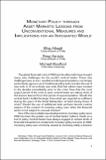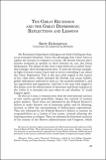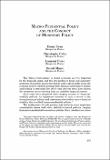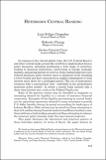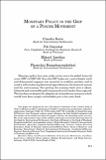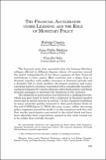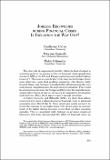Search
Now showing items 31-40 of 48
Monetary policy thorugh asset markets: lessons from unconventional measures and implications for an integrated world
The global financial crisis of 2008 and its aftermath have brought many new challenges for the world’s central banks. These new challenges have in turn resulted in bold experimentation—not simply particularly vigorous use of traditional policy tools but also the use of new tools or if not entirely new ...
The great recession and the great depression: reflections and lessons
My Economics Department colleagues are fond of telling me that as an economic historian I have the advantage that I don’t have to update my lectures in response to events. My history lectures don’t become outdated as quickly as their lectures on say the Great Moderation. The fallacy of this view is ...
Macro-prudential policy and the conduct of monetary policy
The 'Great Contraction' in global economic activity triggered by the financial crisis and the extraordinary fiscal and monetary measures that public authorities had to undertake in order to put the economy back on track by putting public finances under heavy strains and leading to extremely low ...
Inflation targeting in financially stable economies: has it been flexible enough?
The international financial crisis and Great Recession of 2008- 09 called for a range of significant policy measures by central banks beyond aggressive interest rate cuts. Measures have ranged from improving international coordination to purchasing local private loan portfolios and direct intervention ...
Heterodox central banking
In response to the current global crisis the U.S. Federal Reserve and other central banks around the world have implemented diverse policy measures including purchasing a wide range of securities lending to financial institutions intervening in foreign exchange markets and paying interest on reserves. ...
Monetary policy in the grip of a pincer movement
Monetary policy has come under strain since the global financial crisis (GFC) of 2007–09. Once the GFC broke out central banks’ swift and determined response was essential to stabilise markets and to avoid a self-reinforcing downward spiral between the financial system and the real economy. But putting ...
The financial accelerator under learning and the role of monetary policy
The financial crisis that unraveled after the Lehman Brothers collapse affected in different degrees almost all countries around the world independently of the direct exposure of their financial institutions to toxic assets. Most countries saw a sharp drop in demand together with sudden increases in ...
Trilemmas and tradeoffs: living with financial globalization
This paper evaluates the capacity of emerging market economies (EMEs) to moderate the domestic impact of global financial and monetary forces through their own monetary policies. I present the case that those EMEs able to exploit a flexible exchange rate are far better positioned than those that devote ...
Jobless recoveries during financial crises: is inflation the way out?
The slow rate of employment growth relative to that of output is a sticking point in the recovery from the financial crisis episode that started in 2008 in the U.S. and Europe (a phenomenon labeled 'jobless recovery'). The issue is a particularly burning one in Europe where some observers claim that ...
Credit stabilization through public banks: the case of Banco Estado
A novel element in the policy mix that responded to the 2008- 2009 financial crisis was the explicit role given to BancoEstado a publicly-owned commercial bank to alleviate the contraction in domestic credit provided by the banking sector. In order to aid its mission BancoEstado was capitalized by 500 ...

